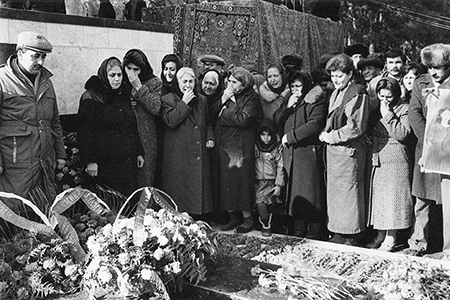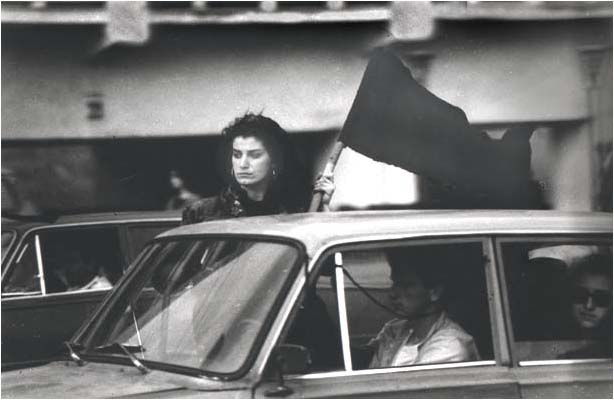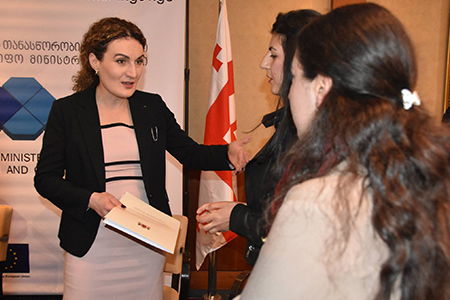Ethnic Georgians among victims of Soviet crackdown remembered by Azerbaijan

The anniversary of a turning point in the modern history of Azerbaijan was marked today at the country’s embassy in Tbilisi, with the occasion paying homage to victims of a Soviet aggression against civilians, including ethnic Georgians, in capital Baku.
January 20 is an annual date marked in Azerbaijan to commemorate the tragic events of 1990 when Soviet troops stormed peaceful protesters of Azerbaijan's Popular Front independence movement.
Authorised by the Soviet authorities with an order by President of the USSR Mikhail Gorbachev, the storming of the civilians by the riot units left over 200 people dead and around 700 injured.

The tragic event took place on the backdrop of peaceful demonstration for Azerbaijan’s independence from the Soviet rule. Photo: Embassy of Azerbaijan in Georgia.
The victims of the tragic event included five ethnic Georgians, while many more were involved in the independence movement that rose in the late 1980s across the then-Soviet Caucasian republics.
The event at the Embassy of Azerbaijan in Tbilisi saw involved officials paying respects to the memory of the deceased and traumatised civilians involved in the 1990 event — remembered as Black January in Azerbaijan.
The occasion also saw an address by Ambassador Dursun Hasanov, who said people of his country remembered the "heroes” of the January 20 protest.
The annual date was also marked by Azeri officials who visited families of the victims of the tragedy, including descendants of the ethnic Georgians killed in the assault on the demonstration in streets of Baku.

The ‘Black January’ crackdown became a subject of official lawsuit by the prosecutor general of Azerbaijan in 1992. Photo: Embassy of Azerbaijan in Georgia.
The violent crackdown on demonstrators in Baku was launched on the night of January 19-20, 1990.
It followed an imposition of the state of emergency by the Supreme Soviet of the Azerbaijan’s Soviet authorities on January 19 that followed an official decree by Gorbachev.
The crackdown took place less than a year after Soviet troops stormed peaceful demonstrators in streets of Tbilisi on April 9, 1989, killing 20 and injuring hundreds of protesters campaigning for Georgia’s independence from the USSR.
Radio Free Europe/Radio Liberty reporter Kenan Aliyev said in his article for the RFERL website in 2010 Azeri citizens were shocked to experience of the January 20 attack in Baku follow the Tbilisi incident in their neighbouring Georgia.
The country was in a state of disbelief: no one thought that, after the bloody events in Tbilisi on April 9, 1989, Moscow would dare to use the army against civilians again. We were still gripped by the "Tbilisi syndrome" — the naive belief that such a tragedy could not happen again,” said Aliyev in his commentary piece.
The state of emergency, declared by the official Moscow, lasted over a year, with "thousands of Popular Front members and sympathisers” were arrested and imprisoned by authorities, said Aliyev in his article.
See a video released by the Government of Azerbaijan in relation to the 27th anniversary of ‘Black January’ below (warning: graphic content — viewer discretion advised):
Azerbaijan’s parliament declared the restoration of the country’s independence from the Soviet Union on October 18, 1991. In 1992, the office of the prosecutor general of Azerbaijan launched a lawsuit against the individuals involved in the massacre.
The tragic events of Black January are now seen by the country’s citizens as a date of national rebirth.
The importance of the event was also underlined by Maia Manchkhashvili, Co-founder of the Institute for Georgia’s Neighborhood Studies at the Tbilisi State University.
Manchkhashvili told Agenda.ge the January 20 date signified the "wave of [Caucasian republics] regaining independence” from the Soviet rule, imposed on their citizens for most of the 20th Century.
 Tweet
Tweet  Share
Share



